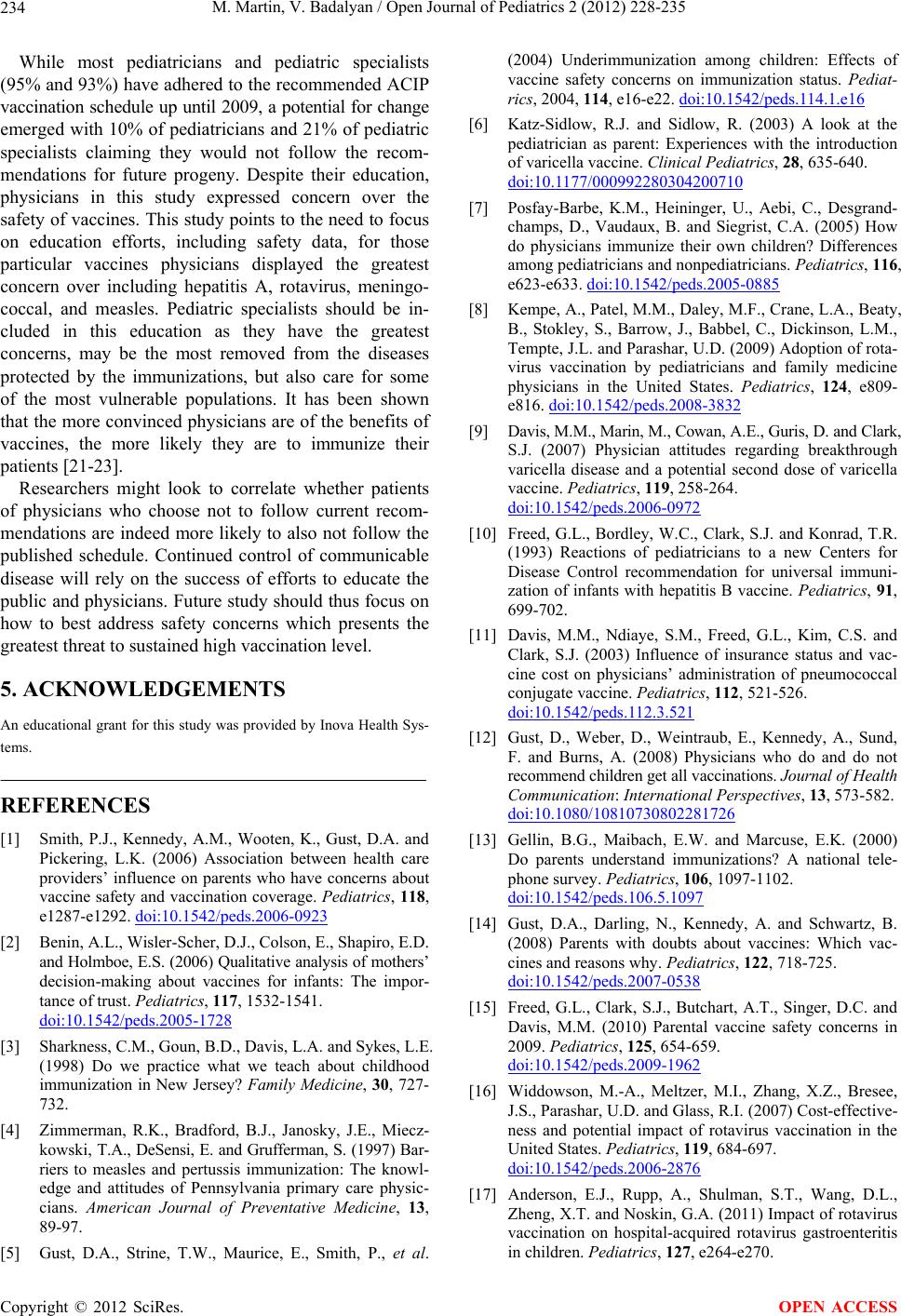
M. Martin, V. Badalyan / Open Journal of Pediatrics 2 (2012) 228-235
234
While most pediatricians and pediatric specialists
(95% and 93%) have adhered to the recommended ACIP
vaccination schedule up until 2009, a potential for change
emerged with 10% of pediatricians and 21% of pediatric
specialists claiming they would not follow the recom-
mendations for future progeny. Despite their education,
physicians in this study expressed concern over the
safety of vaccines. This study points to the need to focus
on education efforts, including safety data, for those
particular vaccines physicians displayed the greatest
concern over including hepatitis A, rotavirus, meningo-
coccal, and measles. Pediatric specialists should be in-
cluded in this education as they have the greatest
concerns, may be the most removed from the diseases
protected by the immunizations, but also care for some
of the most vulnerable populations. It has been shown
that the more convinced physicians are of the benefits of
vaccines, the more likely they are to immunize their
patients [21-23].
Researchers might look to correlate whether patients
of physicians who choose not to follow current recom-
mendations are indeed more likely to also not follow the
published schedule. Continued control of communicable
disease will rely on the success of efforts to educate the
public and physicians. Future study should thus focus on
how to best address safety concerns which presents the
greatest threat to sustained high vaccination level.
5. ACKNOWLEDGEMENTS
An educational grant for this study was provided by Inova Health Sys-
tems.
REFERENCES
[1] Smith, P.J., Kennedy, A.M., Wooten, K., Gust, D.A. and
Pickering, L.K. (2006) Association between health care
providers’ influence on parents who have concerns about
vaccine safety and vaccination coverage. Pediatrics, 118,
e1287-e1292. doi:10.1542/peds.2006-0923
[2] Benin, A.L., Wisler-Scher, D.J., Colson, E., Shapiro, E.D.
and Holmboe, E.S. (2006) Qualitative analysis of mothers’
decision-making about vaccines for infants: The impor-
tance of trust. Pediatrics, 117, 1532-1541.
doi:10.1542/peds.2005-1728
[3] Sharkness, C.M., Goun, B.D., Davis, L.A. and Sykes, L.E.
(1998) Do we practice what we teach about childhood
immunization in New Jersey? Family Medicine, 30, 727-
732.
[4] Zimmerman, R.K., Bradford, B.J., Janosky, J.E., Miecz-
kowski, T.A., DeSensi, E. and Grufferman, S. (1997) Bar-
riers to measles and pertussis immunization: The knowl-
edge and attitudes of Pennsylvania primary care physic-
cians. American Journal of Preventative Medicine, 13,
89-97.
[5] Gust, D.A., Strine, T.W., Maurice, E., Smith, P., et al.
(2004) Underimmunization among children: Effects of
vaccine safety concerns on immunization status. Pediat-
rics, 2004, 114, e16-e22. doi:10.1542/peds.114.1.e16
[6] Katz-Sidlow, R.J. and Sidlow, R. (2003) A look at the
pediatrician as parent: Experiences with the introduction
of varicella vaccine. Clinical Pediatrics, 28, 635-640.
doi:10.1177/000992280304200710
[7] Posfay-Barbe, K.M., Heininger, U., Aebi, C., Desgrand-
champs, D., Vaudaux, B. and Siegrist, C.A. (2005) How
do physicians immunize their own children? Differences
among pediatricians and nonpediatricians. Pediatrics, 116,
e623-e633. doi:10.1542/peds.2005-0885
[8] Kempe, A., Patel, M.M., Daley, M.F., Crane, L.A., Beaty,
B., Stokley, S., Barrow, J., Babbel, C., Dickinson, L.M.,
Tempte, J.L. and Parashar, U.D. (2009) Adoption of rota-
virus vaccination by pediatricians and family medicine
physicians in the United States. Pediatrics, 124, e809-
e816. doi:10.1542/peds.2008-3832
[9] Davis, M.M., Marin, M., Cowan, A.E., Guris, D. and Clark,
S.J. (2007) Physician attitudes regarding breakthrough
varicella disease and a potential second dose of varicella
vaccine. Pediatrics, 119, 258-264.
doi:10.1542/peds.2006-0972
[10] Freed, G.L., Bordley, W.C., Clark, S.J. and Konrad, T.R.
(1993) Reactions of pediatricians to a new Centers for
Disease Control recommendation for universal immuni-
zation of infants with hepatitis B vaccine. Pediatrics, 91,
699-702.
[11] Davis, M.M., Ndiaye, S.M., Freed, G.L., Kim, C.S. and
Clark, S.J. (2003) Influence of insurance status and vac-
cine cost on physicians’ administration of pneumococcal
conjugate vaccine. Pediatrics, 112, 521-526.
doi:10.1542/peds.112.3.521
[12] Gust, D., Weber, D., Weintraub, E., Kennedy, A., Sund,
F. and Burns, A. (2008) Physicians who do and do not
recommend children get all vaccinations. Journal of Health
Communication: International Perspectives, 13, 573-582.
doi:10.1080/10810730802281726
[13] Gellin, B.G., Maibach, E.W. and Marcuse, E.K. (2000)
Do parents understand immunizations? A national tele-
phone survey. Pediatrics, 106, 1097-1102.
doi:10.1542/peds.106.5.1097
[14] Gust, D.A., Darling, N., Kennedy, A. and Schwartz, B.
(2008) Parents with doubts about vaccines: Which vac-
cines and reasons why. Pediatrics, 122, 718-725.
doi:10.1542/peds.2007-0538
[15] Freed, G.L., Clark, S.J., Butchart, A.T., Singer, D.C. and
Davis, M.M. (2010) Parental vaccine safety concerns in
2009. Pediatrics, 125, 654-659.
doi:10.1542/peds.2009-1962
[16] Widdowson, M.-A., Meltzer, M.I., Zhang, X.Z., Bresee,
J.S., Parashar, U.D. and Glass, R.I. (2007) Cost-effective-
ness and potential impact of rotavirus vaccination in the
United States. Pediatrics, 119, 684-697.
doi:10.1542/peds.2006-2876
[17] Anderson, E.J., Rupp, A., Shulman, S.T., Wang, D.L.,
Zheng, X.T. and Noskin, G.A. (2011) Impact of rotavirus
vaccination on hospital-acquired rotavirus gastroenteritis
in children. Pediatrics, 127, e264-e270.
Copyright © 2012 SciRes. OPEN ACCESS